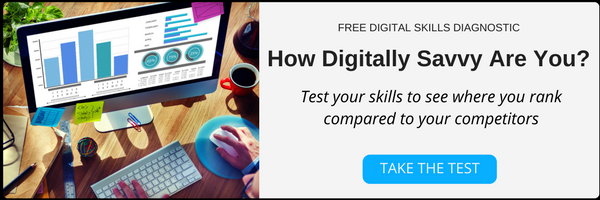How to Leverage Continual Learning to Gain a Digital Advantage
As we discussed earlier this month, digital transformation is opening the door for increased transparency and improved collaboration. As businesses rethink their approach to organization and communication, it is essential for salespeople to adopt a strategy of lifelong learning.
Thanks to the rise in digital technology, there are now many tools to help salespeople learn about industry trends, scope out competition, share information with collaborators, and improve sales process. The key to riding the digital wave is to keep an open mind. You may have years or decades of experience in sales, but when it comes to digital technology, everyone has something to learn.
Let’s take a closer look at what salespeople and managers can do to stay ahead of the curve.
Salespeople
In today’s digital world, a willingness to keep learning and the ability to adapt are crucial for success. According the Digital Marketing Institute, 68% of companies rank agility among the top three considerations.
So, how do you adapt as new technologies emerge?
Always. Be. Learning.
The benefits of continual learning over the course of a career range from increased earning potential to improved health. Learning the ins and outs of new technology is easier when you’re in the mindset of learning new things in general. If your company doesn’t offer training, talk to your manager about educational opportunities to help you stay competitive. Pay attention at training sessions, take useful notes, and seek out apps and tools that can help you improve your process and productivity. You can practice your pitch by listening back to your calls or reviewing videos of virtual meetings or webinars.
Now more than ever, salespeople need to stay knowledgeable of new tools and trends so they can be consultants to their clients (as opposed to transactional salespeople). As clients become more sophisticated about purchasing, they will often need a “justifier” or something that will make a noteworthy difference to their company’s business. According to a study, sometimes purchasers will only share a deal-breaking concern with one supplier on their shortlist and “if the salesperson takes the time to listen and devise a solution, the purchasing manager has his or her justifier.”
How do you make it on the shortlist and become that one trusted consultant? Learn about industry-specific problems and concerns that affect your clients’ buying decisions. Once you’ve closed the deal and introduced your business solution, ask the client for feedback. Experts recommend asking open ended questions to encourage the client to “respond in an expansive fashion and bring up something they might otherwise neglect.”
Action items:
Find an industry specific publication or association that can help you understand your client’s business better. Use this information to stay ahead at every stage of the game: Research an account before your first meeting; learn about challenges, trends, budgets, and potential needs of businesses in a particular industry or territory; learn about your client’s competitors, especially new ones.
If you don’t do so already, connect with other sellers who can share their questions and best practices on LinkedIn or in other discussion groups. Become an expert in the field and demonstrate to your client that you understand their specific challenges and want to work with them on their goals.
Sales Managers
In order to leverage the benefits of digital and the talents of your sales team, consider the customer’s experience with your company and redesign your sales funnel. One of the ways that digital transformation is helping sales teams in particular is through the introduction of tools that find potential leads and turn them into prospects. Today, salespeople may be most effective when deployed further down the funnel: “closing hot prospects, providing follow-up service, and cultivating long-term relationships.”
In addition to rethinking your sales strategy, learn about digital tools and keep your sales team in the know. How can you do that? By offering digital training. When you incorporate training into the work day, you’re demonstrating to your team that you’re interested in bringing them into the process and helping them upskill. Fortunately, digital learning programs are making it easier and more efficient than ever to keep your team up to speed.
Action Item:
Research digital learning tools and in-person training programs that will suit your business the best. Apps like SmartUp and DMT’s Digital Diagnostic are a good place to start to assess where your team currently stands.
Recap
Maintaining a working knowledge of emerging digital tools is essential for salespeople and sales managers. Keep an open mind to learning. While you may be a sales expert, technology is advancing every day and everyone must keep learning in order to stay ahead of the curve. For managers: help your sales team by facilitating digital training.
Ready to test your skills? Try our free diagnostic test to see where you stack up against the digital competition.
About Brittany Bookbinder
Brittany is an actor, writer, and Muppet enthusiastic. She grew up on Long Island, where her hobbies included writing love poems and watching TGIF, often at the same time. These days, she writes for Evil Studios Ltd., performs comedy and music, and makes video shorts independently and with the iO Comedy Network. She has performed in independent films, regional theatre, sketch comedy and improv all over Chicago. She is also an artistic collaborator with Theater Unspeakable, with whom she co-created Superman 2050 and Murder on the Midwest Express. She has performed Superman 2050 throughout the country, including Lincoln Center in NYC and the Kennedy Center in DC. Training: She holds a B.S. Theatre, a minor in Creative Writing and a certificate in Music Theatre from Northwestern University. She has studied acting at the School at Steppenwolf and British American Drama Academy. She has studied improv in the Second City Conservatory, iO Chicago, CIC Theatre and currently at the Annoyance. Brittany is a guest blog contributor for DMTraining.





